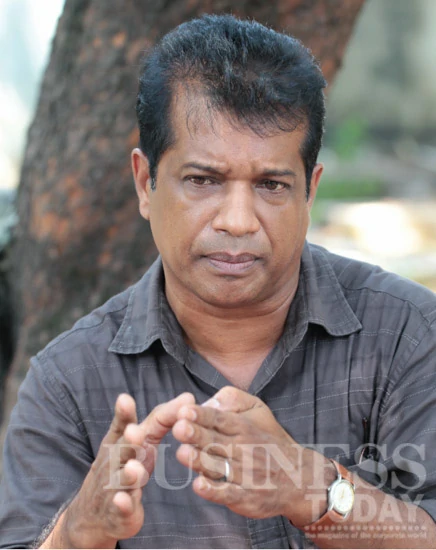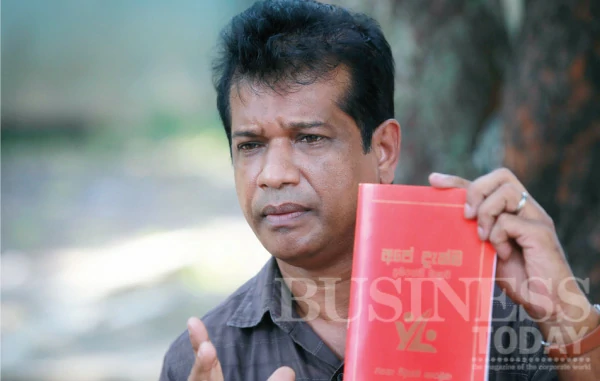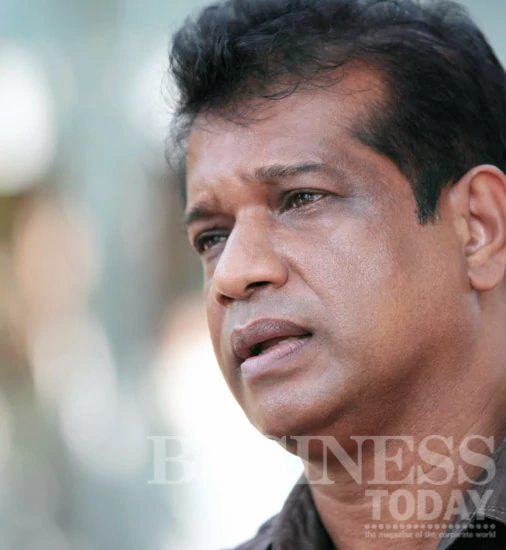
K D Lal Kantha is the Chief Ministerial candidate of the Janatha Vimukthi Peramuna (JVP) in the upcoming Western Provincial Council elections. The JVP entered mainstream politics in 1994 and during this ten year long journey the JVP has made many decisions that have changed the course of the party. However, Lal Kantha says that the JVP is now again on the right track while building confidence with its support base. He believes that the JVP will emerge stronger as the people are seeking an alternative…
Words Udeshi Amarasinghe Photographs Mahesh Bandara and Indika De Silva
As the Chief Ministerial Candidate of the JVP for the Western Province, what are the key areas that you are focusing on in this election?
Considering the issues and difficulties the country has faced so far, we need a political change at national level. If I explain in my own words, if the sprout of the coconut tree has been struck by lightening, there may be a few green fronds and bunches of coconuts, but there is no use because we all know that when a tree is struck by lightening the tree dies. Therefore, this country needs new policies for a national political conversion. The JVP has the potential as well as the mechanism through policies and systems to make that change. We cannot implement these policies through the Provincial Council, and the forthcoming election is not the right moment to execute these policies. However, we have presented our manifesto, which is focused on the Provincial, General and Presidential elections.
We Will Definitely Secure A Victory. We Are Asking The People To Elevate Us From Our Current Position. That Is Our Victory… That Is Sufficient To Take Us To The Next Level And Enable Future Victories.
Why should the people elect you as the Chief Minister of the Western Province?
The people should vote for me as well as the JVP at the Provincial Council elections to take the first step in electing a new government at the next General elections. The people of this country are concerned with the rising cost of living. Then the rise in corruption, waste and crimes. The transformation required to address these issues cannot be sought through the Provincial Council elections. The solution must be at a national level to ensure that the country does not deteriorate in terms of the economy, culture and politics. The JVP must be elected this time to give hope to the people and the forces that await a national political conversion. Therefore, we can guarantee that we have the capability, determination and drive to make the necessary change in this country.
How will the JVP fare in this election?
We will definitely secure a victory. We are asking the people to elevate us from our current position. That is our victory. We have an Executive President who has a 2/3 majority in Parliament in this country, therefore, we cannot expect a complete victory from this election. Considering the current situation in the country as well as our position, it is possible to reduce the number of votes for the UPFA through the combined efforts of the opposition forces. That is sufficient to take us to the next level and enable future victories. In that way we are certainly going to be victorious.
Why should the people vote for the JVP, what difference will it make?
We are different from all the other parties in the country because we are a volunteer organisation. There is no other party like us. All the members of the JVP are volunteers, which means that we don’t get any personal benefits by engaging in politics. I was a Member of Parliament for nine years and also a Cabinet Minister. There were many other JVPers who were Cabinet Ministers as well. We have never received anything for personal benefits. Politicians become profiteers when they try to gain wealth through politics and then they put themselves first and not the country. The root of all the complaints against the behaviour of Sri Lankan politicians is that they are engaged in politics to amass wealth. Therefore, the JVP should be elected at Provincial and National level to take this country onto the right path in order to uplift this country. There is no other solution than to vote for us and ensure that we can form a government.
At one time the JVP was a strong political party, today it is not so. Do you agree?
As a political party we are still strong. But some of our voters, and those outside who were with our party, have walked away from us today. In that case our present strength is less than earlier. We entered into this chapter of our journey in 1994. That day we spoke against both sides as we considered them the same and as such we were able to gather supporters who accepted us. We stood against the separation of the country and joined with other forces that had similar views to defeat it. People voted for us and we were very strong. But with the advent of alliance politics, we had to transfer the combined forces on to someone else’s lap and exit the alliance. Then it was only us. President Mahinda Rajapaksa was able to gather all those forces and hold them within the government. It is only now these links are disentangling.
During the last few years our strength has reduced, but now again we are reattempting to unmask both the United National Party and Sri Lanka Freedom Party to build a new force based on us. We have already started that process. We are positive that considering the present situation in the country, the people will support us with a greater force than before where we will emerge stronger.
You mentioned that the voters moved away from the JVP. Why is that?
Actually more than the voters distancing themselves from us, what happened was that there was a conflict for 30 years. When it was clear that the war was going to end, and at the same time elections were also held, people wanted to see an end to the conflict so they voted for the betel leaf, the SLFP. A government could not be formed only with SLFP votes, nor UNP votes or JVP votes. Therefore, it was where the societal forces were converging that the votes would be obtained and it is them who voted for us. However, we lost those votes in the recent past.
It has been almost five years since the end of the war and the people can clearly see the true nature of the government. That is why the government is criticised by the UNP and the JVP. We have our own party and the UNP has their own party. But who else is questioning the government? It is the floating vote of the intellectuals and intelligent people who voted for the SLFP. They need an alternative and that is what we are trying to create. They were with us before, but joined the other party, which is the reason we received a reduced number of votes.
The JVP was key to the downfall of the 2001-2004 Government and crucial for the victory of President Mahinda Rajapaksa in 2005, but today that relationship is not there. Your thoughts.
In 2001, the then government signed a ceasefire agreement with LTTE, which posed a threat to the sovereignty of the country. It was a serious issue. To change that we formed an alliance in 2003, participated in the election in 2004, formed an alliance government and then stepped out.
We Feel Now That We Should Not Have Formed An Alliance In 2003, But Should Have Taken The Struggle Forward Under The JVP Alone.
When the Presidential elections were announced, Mahinda Rajapaksa was the SLFP candidate. As a major partner of the alliance we had to support the SLFP’s candidate for Presidential election whether it was Mahinda Rajapaksa, Nimal Siripala De Silva or Maithripala Sirisena. However at that time we did not sign an agreement with Mahinda Rajapaksa in relation to power sharing but what we agreed upon wer the policies. However, we did not join the government, but the other forces that came with us joined the government and the JVP stood alone. That is the reason why the influence we could have on the society diminished. By 2010 Mahinda Rajapaksa secured victory again. However, there are changes happening.
We feel now that we should not have formed an alliance in 2003 and should have taken the struggle forward under the JVP alone. We made a mistake by placing the forces that came with us under another leadership. If we kept it under our leadership, we would have ended the war and also taken the country on a path of development. Therefore, we seriously regret creating an alliance in 2003, it was wrong. Secondly, leaving the alliances prematurely while keeping our forces behind was also a mistake. We should have stayed in the alliance for a while longer and left with our forces. We have made two mistakes. It stopped us from going forward. It was a learning experience and we will not make that mistake again. We want to bring together all the forces in the country and form a front to take the struggle forward and we tell the people to join in these endeavours for the betterment of the country.
The JVP supported the government in its efforts to end the war. However, at the time of celebration the JVP was not there. Why was that?
There is a major reason behind it. We actually do not like to say that ‘we won the war’. We’d rather say that we finished the war. Because when we talk about a victory, whether we like it or not, we are hurting the feelings of another community by implying a defeat. We didn’t want to defeat another community, what we wanted was to end the war. There was and still is an opportunity to take the country towards development after ending the war. Though we have ended the war, we have not yet brought victory to the country. At that time we did not celebrate by eating milk rice because we have the responsibility to unite the country and lead it towards a victory and we didn’t want to hurt another community. In short, the JVP does not support the Victorious War Celebration held on May 19. It hurts another community. What is finished is finished, what we want is to bring all the communities together and create a victorious and united country. Then only can we celebrate the true victory and the sacrifices made by our brave Armed Forces.
We Invite The Private Sector To Study Our System And Let Us Know The Shortcomings And Join With Us To Use Their Abilities For The Country’s Future.
What can the business community expect from the JVP?
I met a business person recently who has paid nine million rupees in taxes. His children do not attend government schools nor does he go to government hospitals for treatment. He hasn’t utilised anything from the government. But he has provided job opportunities for about 400 people. We have that kind of private sector in this country. They haven’t been recognised nor have they been appreciated by any government organisation so far. We hope to implement a programme under our leadership where we recognise them as important people in this country. In our manifesto, we also promise that we will develop an economy based on production. At present the engine of growth is the private sector. The JVP hopes to provide all facilities to the private sector and also provide a tax free provision for those who take part in the development journey.
There is another issue we face today, which is that industry owners in the private sector do not have a place to take their problems to. They have to go behind ministers or some other person. Therefore, we hope to form an institute with the required authoritative power where the private sector can find solutions for their difficulties. We invite the private sector to study our system and let us know the shortcomings and join with us to use their abilities for the country’s future.
Final thoughts?
The people are questioning the misdeeds of the government. The government talks about developments but if we really consider the development of the country when voting, then we should still vote for the British. They made railway lines, bridges, culverts and railway stations. They built quarters for station masters to all the other workers and labourers. They were the people who built the Fort Harbour, the Fort Railway Station and also the Colombo Municipal Council. They introduced tea to our country. Tea is one of the major agricultural products of our economy. But we rejected them because they destroyed the country while developing it. We feel that the current situation is the same. Therefore, without looking at roads, bridges and culverts look at all the areas, which are required to develop a country and express your concerns and opposition properly. That is what we ask from the voters.







